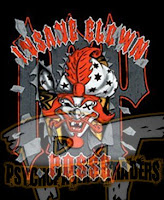
Music censorship has been a major problem plaguing America for over fifty years. In 1957, Elvis Presley was only allowed to be filmed from the waist up on the Ed Sullivan show (EP Music). Plenty of controversy has taken place between then and now, but more recently it has become mush more prominent in the media, and people and organizations are beginning to actually take a stand.
 For example, Island Records, owned by Disney, dropped the Insane Clown Posse just after their release of The Great Milenko (MTV Network) and MTV actually refused to play Madonna’s video for Justify My Love because it was considered too sexually explicit.
For example, Island Records, owned by Disney, dropped the Insane Clown Posse just after their release of The Great Milenko (MTV Network) and MTV actually refused to play Madonna’s video for Justify My Love because it was considered too sexually explicit. 
In Madonna’s “Like A Prayer” video she burned crosses, kissed an African American Saint, and showed stigmata. As a result Pepsi pulled their sponsorship for her tour, as well as cancelled her Pepsi commercial (Celebrity Ragazine).
Music content is just one of the many issues that puts the First Amendment of our Consitution to work. On one hand people believe that lyrics should be censored as that people can be protected, and on the other hand, people believe that the First Amendment protects everyone’s rights to free speech. Basically, it is a matter of wheather lyrical censorship is accepted. Many people say yes, that there should be censorship because lyrics from songs are telling our youth it is acceptable to participate in illegal actions such as murder, rape or drugs. These people believe that the lyrics actually drive people to become social deviants. In one case, the parents of John McCullom sued Ozzy Osbourne, because his song “Suicide Solution,” “aided, advised and encouraged” McCullom’s suicide.
In my opinion, I think it is unconstitutional to censor lyrics. The First Amendemtn gives everyone the equal right to speak freely about anything, in any way. This does not exclude musicians. If I am allowed to speak my opinion, positively or negatively, on a subject, then so is a lyricist, eve if he/she is speaking to the public. When an organization such as the Christian Coalition protests against artists, that is the same idea of musicians’ controversial lyrics (Schapiro). Both sides are expressing two extreme views, and if one side is going to be stifled, then so should the other. I believe Thomas C. Grey explained it best when he said, “if you are going to regulate speech, then you’re going to create the danger of suppressing debate, and suppressing ideas” (Grey 18-24).
1. Madonna - Like A Prayer (1989)
2. Britney Spears - Baby One More Time (1999)
3. Michael Jackson - Thriller (1983)
4. Madonna - Ray of Light (1998)
5. Madonna - Vogue (1988)
6. Michael & Janet Jackson - Scream (1995)
7. Robbie Williams - Rock DJ (2000)
8. Eric Prydz - Call On Me (2004)
9. Jamiroquai - Virtual Insanity (1997)
10. Spice Girls - Wannabe (1996)



No comments:
Post a Comment